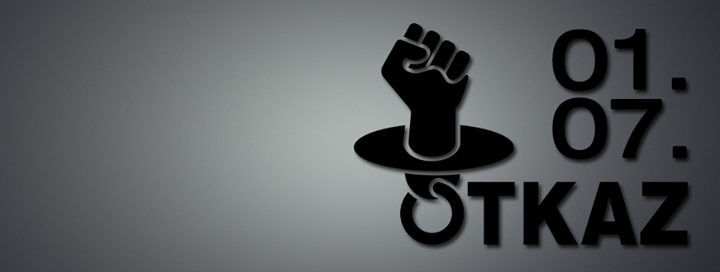Bosnia-Herzegovina's parliament has missed the July 1 deadline set by angry protesters demanding members fix a lapse in the country's law that is preventing newborns from being given an identity number and, by extension, travel papers and healthcare.
For more than a month, citizens have been protesting in front of their national parliament, requesting that urgent amendments be made to legislation related to Unique Master Citizen Numbers, abbreviated JMBG [1]. The protests, which have been dubbed the “Babylution”, took off [2] when a gravely ill three-month-old girl died while waiting to receive this unique identity number so that she could receive treatment and surgery abroad. Outrage against this denial of basic human rights ensued across several Balkan states after the tragic event and crossed ethnic divides in the region.
The protesters had given the legislative body a July 1, 2013 deadline to remedy the lapse in the ID number law, which expired in February. On July 1, as Croatia celebrated [3] its official entry into the European Union, thousands of people gathered in the capital Sarajevo before the parliament building to send their government representatives a clear message – “You are fired!” – and inform the international community of the situation in an open letter [4].

“Babylution” cover photo being distributed across social networks: “01.07. Dismissal”; image courtesy of Babylution Facebook fan page.
Protests were also held across the Federation of Bosnia-Herzegovina, in Mostar, Tuzla, Zenica, Prijedor, Bugojn and other cities and towns.
Blogger Tom Simpson was among those who joined [5] the “Babylution” online:
In the thrilling and agonizing meantime, protestors [sic] will have to muster all the courage, patience, and creativity they can. For its part, the rest of the world needs to keep putting pressure on Bosnian politicians to do the right thing: secure basic human rights and freedoms for all citizens of BiH. The Bosnian struggle is a deeply human one, and the world should stand with Bosnians and Herzegovinians, as they stand up for themselves, choose love, and dare to hope.
In the meantime, the Bosnian-Herzegovinian parliament held a session [6] [bos], during and after which nothing changed. During the session, the #JMBG [7] protests were labeled as “a hostage crisis” [8] and the issues were devolved into accusations between the political parties. Solutions to issues that might benefit the citizens of Bosnia-Herzegovina never came as a point of order.
Lawmakers who voiced any concern over this [9] [bos] were far and few between, among them member of parliament Anto Domazet:
Današnja rasprava o sigurnosnoj situaciji pokazuje da je fokus poslanika na političkom pitanju koje je izazvalo i zastoj u radu i vanrednu situaciju. „Međutim, mi se moramo zapitati šta je velika stvar koja će se desiti u političkom životu BiH? Očigledno je da građani traže politički pluralizam, da o bitnim stvarima ne odlučuju lideri ili stranke već i oni sami. To je nešto na što ćemo se morati navići“, istakao je.
Smatra da poslanici moraju imati u vidu da će živjeti i raditi paralelno s civilnim aktivizmom.
Today's debate about security issues demonstrates that the focus of members of parliament is on the very political matters that provoked the delay in procedure and the crisis situation.
“However, we must ask ourselves what is the great matter that will happen in the political life of Bosnia-Herzegovina? It is evident that the citizens want political pluralism, not to have leaders or parties decide on matters, but that they themselves also [should decide]. This is something we will have to get used to,” [Domazet] emphasized.
On social networks, the anger [10] hasn't died down. Political science student Olivier Gonner (@igonnerclast [11]) wrote [12]:
@igonnerclast [12]: Ermin Zatega: “The emperor is naked” – A brilliant metaphor by Hans-Christian Anderson to describe #JMBG [13]-Protests in #Bosnia [14]. #Bebolucija [15]
Edita Gorinjac (@EditaGorinjac [16]), a journalist from Sarajevo, was among those who criticize [17] the Parliament:
@EditaGorinjac [17]: Zastup. u #ParlamentBiH [18] kritiku njihovog rada nazivaju blaćenjem. Kažu to nema nigdje u svijetu. Nisam sigurna o kojem svijetu govore.#jmbg [13]
@EditaGorinjac [17]: Representation. In #ParlamentBiH [18] they are calling criticism of their work mudslinging. They say it is unseen anywhere in the world. I'm not sure which world they're talking about. #jmbg [13]
Another user on Twitter, Mahir Vražalić (@Mahir_Vrazalic [19]), noticed [20]:
@Mahir_Vrazalic [20]: Znaci u Parlamentu o svemu sem #JMBG [13]….
@Mahir_Vrazalic [20]: So in Parliament they're discussing everything except #JMBG [13]….
Edis Jasarevic (@EdisPG [21]), a racing commentator, added [22] sarcastically:
@EdisPG [22]: Molimo da se u parlamentu pušta samo lagana jazz muzika, kako poslanici ne bi osjecali pritisak, i barem 2x dnevno antistres masaze #jmbg [23]
@EdisPG [22]: We ask that only smooth jazz music be played in parliament, so that members of parliament don't feel pressured, and anti-stress massages at least 2x a day #jmbg [23]